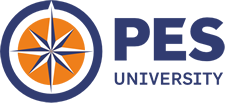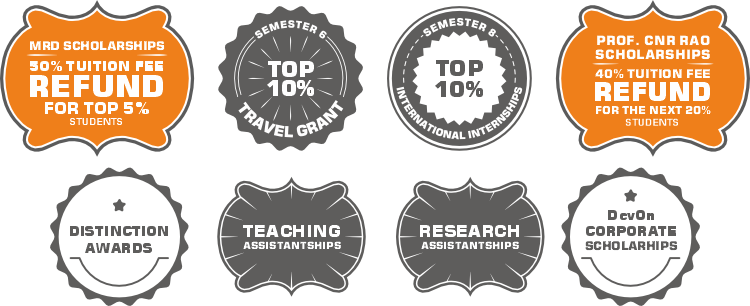Program Outline
B.Sc (Hons) in Medical Science
Eligibility
Must have completed 10+2 with Physics, Chemistry & Biology as their main subjects from a recognized board with a minimum aggregate of 50%
Register for Admissions
This course is for students with a love for humanity who wish to contribute to health & welfare through scientific knowledge & medical technology, with human values. This program is designed for those willing to make a career in the medical & allied fields.
While pursuing a B.Sc Medical Science course, students get to learn various topics such as structure & function of human body in health & diseases, develop skills & expertise to assist health care teams for the best possible outcome of the suffering humanity. This course will help students develop a research aptitude, critical thinking, analytical skills & soft skills to assist other members of Health care team. After completing the course students can find jobs in areas like healthcare, pharmaceutical companies & other allied sectors & education, environment protection agencies, transcript centres, Government & private health insurance sectors, Biotech & medical college hospitals. The salary package offered to B.Sc (Medical) graduates is good & the demand for this program will increase with expansion of health care programmes/industry in both Government & private sectors.
Who Should Pursue this Program?
Program Design & Delivery Method
The B.Sc Medical Science course is of 3+1 years spread over 8 semesters. The fourth year is for internship in a field/speciality of their choice.
The First Year: introduces you to the science of life, to the scientific method & clinical practice. In the first year of Medical Science degree, one will begin to explore the intricacies of human anatomy, from cellular & molecular biology all the way through to physiology. This broad understanding helps to make sense of the relevance & importance of normal body function. One will learn the principles of biomedical sciences, human nutrition, & metabolism to further understand the human body.
The Second Year: builds on the foundations laid in year 1. Introduction to case-based learning with clinical practice which will help to understand what happens when people become ill.
The Third Year: lets you choose modules that are most relevant to your career aims. There will be core modules in public health, modern research approaches, & regenerative medicine, as well as optional areas like 'bench to bedside' or anthropology, alongside a project work. All areas of the Medical Sciences course provide extra opportunities for clinical training & research, which will improve career potential.
Year Four: Working with senior doctors in clinical workstations (wards, critical care units), documenting & carrying out tests & prescription of medicines as per their instructions, transcription of patient data & facilitating insurance processes. One can choose yoga & spirituality, common mental illnesses, lift style diseases, human Genome project, stem cell technology, Artificial intelligence, Digital/Machine learning, Medical equipment, Clinical Intelligence engine & Robotics in medical fields & learn more by doing projects.
Teaching: One will learn through lectures, tutorial support, workshops, practical laboratory sessions, directed & self-directed study & approximately 80 hours of work-based learning in university hospitals. One is exposed to case/problem-based learning, & the same will be assessed in a similar way to medical college exams. These teaching methods promote lifelong learning, open inquiry, teamwork, & critical thinking which are essential transferable skills.
Pedagogy Method
Curriculum Structure
| Subject |
|---|
| Etymology of Medical terms, Human anatomy & physiology |
| Building Blocks of Life, Human growth & development |
| Introduction to biomedicine |
| Pathology |
| Introductory Microbiology |
| Clinical & Metabolic Biochemistry |
| Subject |
|---|
| Principles of Drug Action |
| Bacteriology & Virology |
| Fundamentals of Physics for Medicine |
| Public Health & Nutrition |
| Mathematics & Statistics |
| Subject |
|---|
| Correlative / applied human Anatomy & Physiology |
| Key Skills in Biomedicine |
| Pharmacology, Molecular Drug Targets & Toxicology |
| Medical Applications of Physics |
| Endocrinology overview |
| Subject |
|---|
| Cells & Immunity |
| Microorganisms & disease |
| Infectious Diseases- overview |
| Human molecular genetics |
| Professional Skills for Healthcare |
| Subject |
|---|
| Research Project & Career Development |
| Global Health Challenges |
| Modern Molecular Advances |
| Regenerative Medicine |
| Bench to Bedside, or Human Variation |
| Assistive Technology & Rehabilitation Engineering |
| Radiation in Medicine |
| Research Project |
| Subject |
|---|
| Medical Genetics |
| Cardiovascular Disease |
| Evolution in Health & Disease: Lessons from the Natural World |
| Seminars in Biology |
| Artificial intelligence |
| Digital/ Machine learning |
| Medical equipment |
| Clinical intelligence engine |
| Robotics in medical fields |
| Subject |
|---|
| Research project |
| Internship |
| Mental illness |
| Lifestyle diseases |
| Subject |
|---|
| Human Genome project |
| Stem cell technology |
| Medical technology |
Note: Information mentioned here is subject to change without prior notice.
Future Career Prospects After Completing the Program
Health Care Assistant
A B.Sc Medical Science graduate will be able to work in any health care setup like medical college/corporate hospitals, large nursing homes, assisting doctors & nurses in providing optimum care for the best possible outcome.
Research Assistant
A B.Sc Medical Science graduate will be able to work in a research organization as a research assistant contributing with the background knowledge of human biology & technology use in medicine & patient care.
Public Health
A B.Sc Medical Science graduate will be able to work in a government organization as a public health assistant to the medical officers & oversee the implementation of the program in the community.
Health Insurance Officer
A B.Sc Medical Science graduate will be able to work as a knowledgeable officer in scrutiny, approval, sanction, & dispersal of payments to the insured persons with plenty of scope in Private health insurance companies & LIC of India.
Medical Transcriptionist
A B.Sc Medical Science graduate will be able to work as a medical transcriptionist wherein the manuscript of patient records is converted into digital format for storage & retrieval by the agencies.
Non-Governmental Organizations
A B.Sc Medical Science graduate will be able to work as a NGO in private sector brining out a change in health seeking behaviour, health promotion, immunization & several national health programmes.
Post Graduate Courses
A B.Sc Medical Science graduate will have opportunity to pursue higher education viz., MSc, PhD in Human Anatomy, Human Physiology, Medical Pharmacology, Medical Biochemistry, Medical Microbiology, Medical genetics, Medical Biotechnology, & research in the related fields. MBA is also open for them.
Regenerative Medicine
A B.Sc Medical Science graduate will be able to find jobs with plenty of scope to research in cell biology, genetics, & biotechnology.
Hospital Administrator/ Executive
A B.Sc Medical Science graduate will be able work as a hospital administrator/ executive in small to medium size health care establishments as well as large corporate/ medical college hospitals.

Extra-Curricular/ Co-Curricular Activities in the Program
Practical Exposure




